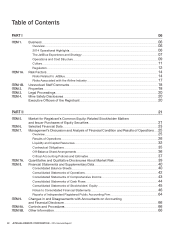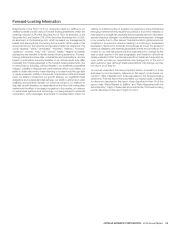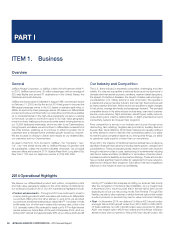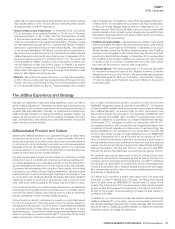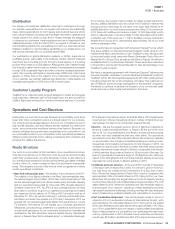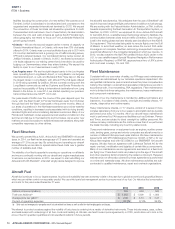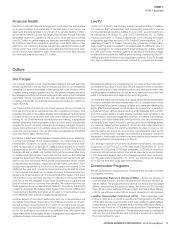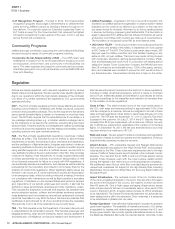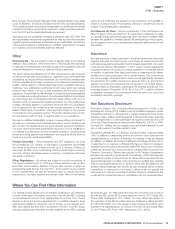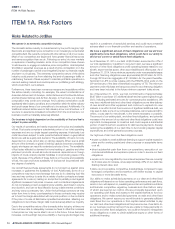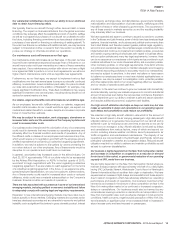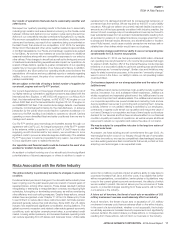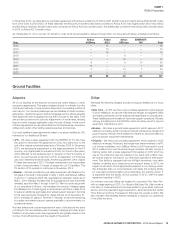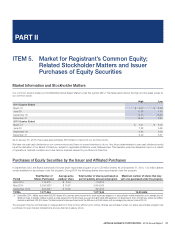JetBlue Airlines 2014 Annual Report Download - page 18
Download and view the complete annual report
Please find page 18 of the 2014 JetBlue Airlines annual report below. You can navigate through the pages in the report by either clicking on the pages listed below, or by using the keyword search tool below to find specific information within the annual report.
JETBLUE AIRWAYS CORPORATION-2014Annual Report12
PART I
ITEM 1Business
•
Lift Recognition Program – Formed in 2012, this Crewmember
recognition program encourages Crewmembers to celebrate their
peers for living JetBlue’s values by sending e-thanks through an on-
line platform. On a periodic basis our Executive Leadership Team, or
ELT, hosts an event for the Crewmembers that received the highest
Lift award recognitions in each quarter of the year. In 2014, we saw
almost 84,000 Lift nominations.
Community Programs
JetBlue is strongly committed to supporting the communities and BlueCities
we serve through a variety of community programs including:
•
Corporate Social Responsibility (CSR) – The CSR team was
established to support not-for-profit organizations focusing on youth
and education, environment, and community in the BlueCities we
serve. The team organizes and supports community service projects,
charitable giving and non-profit partnerships such as KaBOOM! and
Soar with Reading.
•
JetBlue Foundation – Organized in 2013 as a non-profit corporation, this
foundation is a JetBlue-sponsored organization to advance aviation-related
education and to continue our efforts to put aviation on the map as a
top career choice for students. We intend to do this by igniting interest
in science, technology, engineering and mathematics. The foundation is
legally independent from JetBlue and has a Board of Directors as well as
an Advisory Committee, both of which are made up of Crewmembers.
The foundation is recognized by the IRS as a tax-exempt entity.
•
USO Center T5/JFK – Continuing our tradition of proudly supporting the
men, women and families of the military, in September 2014 we opened
a USO Center in T5 at JFK. The Center is open seven days a week, 365
days per year for military members and their families traveling on any
airline at JFK, not just JetBlue. This brand new center is fully stocked
with computers, televisions, gaming devices/stations, furniture, iPads,
food and beverages and much more. In conjunction with leading airport
design firm Gensler, Turner Construction Company, the PANYNJ and more
than 28 contractors and individual donors, 100% of the space, services,
labor and materials were donated to ensure the USO would be free of
any financial burden. Crewmembers donate time to help run the center.
Regulation
Airlines are heavily regulated, with rules and regulations set by various
federal, state and local agencies. We also operate under specific regulations
due to our operations within the high density airspace of the northeast
U.S. Most of our airline operations are regulated by U.S. governmental
agencies including:
DOT – The DOT primarily regulates economic issues affecting air service
including, but not limited to, certification and fitness, insurance, consumer
protection and competitive practices. They set the requirement that carriers
cannot permit domestic flights to remain on the tarmac for more than three
hours. The DOT also requires that the advertised price for an airfare or a
tour package including airfare, e.g., a hotel/air vacation package, has to
be the total price to be paid by the customer, including all government
taxes and fees. It has the authority to investigate and institute proceedings
to enforce its economic regulations and may assess civil penalties, revoke
operating authority and seek criminal sanctions.
FAA – The FAA primarily regulates flight operations, in particular, matters
affecting air safety. This includes but is not limited to airworthiness
requirements for aircraft, the licensing of pilots, mechanics and dispatchers,
and the certification of flight attendants. It requires each airline to obtain an
operating certificate authorizing the airline to operate at specific airports
using specified equipment. Like all U.S. certified carriers, we cannot fly to
new destinations without the prior authorization of the FAA. After providing
notice and a hearing, it has the authority to modify, suspend temporarily
or revoke permanently our authority to provide air transportation or that
of our licensed personnel for failure to comply with FAA regulations. It
can additionally assess civil penalties for such failures as well as institute
proceedings for the imposition and collection of monetary fines for the
violation of certain FAA regulations. When significant safety issues are
involved, it can revoke a U.S. carrier’s authority to provide air transportation
on an emergency basis, without providing notice and a hearing. It monitors
our compliance with maintenance as well as flight operations and safety
regulations. It maintains on-site representatives and performs frequent
spot inspections of our aircraft, employees and records. It also has the
authority to issue airworthiness directives and other mandatory orders.
This includes the inspection of aircraft and engines, fire retardant and
smoke detection devices, collision and windshear avoidance systems,
noise abatement and the mandatory removal and replacement of aircraft
parts that have failed or may fail in the future. We have and maintain FAA
certificates of airworthiness for all of our aircraft and have the necessary
FAA authority to fly to all of the destinations we currently serve.
TSA – The TSA operates under the Department of Homeland Security and
is responsible for all civil aviation security. This includes passenger and
baggage screening, cargo security measures, airport security, assessment
and distribution of intelligence, and security research and development. It
also has law enforcement powers and the authority to issue regulations,
including in cases of national emergency, without a notice or comment
period. It can additionally assess civil penalties for such failures as well as
institute proceedings for the imposition and collection of monetary fines
for the violation of certain regulations.
Taxes & Fees – The airline industry is one of the most heavily taxed in
the U.S., with taxes and fees accounting for approximately 16% of the
total fare charged to a customer. Airlines are obligated to fund all of these
taxes and fees regardless of their ability to pass these charges on to the
customer. The TSA sets the September 11, or 9/11, Security Fee which
is passed to the customer. On July 21, 2014, the 9/11 Security Fee was
increased from $2.50 per enplanement, with a maximum of $5 per one-way
trip, to $5.60 per enplanement, regardless of the number of connecting
flights. On December 19, 2014, the fee was amended and a round trip
has been limited to a maximum of $11.20.
State and Local – We are subject to state and local laws and regulations
in a number of states in which we operate and the regulations of various
local authorities operating the airports we serve.
Airport Access – JFK, LaGuardia, Newark and Reagan National are
Slot-controlled airports subject to the “High Density Rule” and successor
rules issued by the FAA. These rules were implemented due to the high
volume of traffic at these popular airports located in the northeast corridor
airspace. The rules limit the air traffic in and out of these airports during
specific times; however, even with the rules in place, delays remain
among the highest in the nation due to continuing airspace congestion.
We additionally have Slots at other Slot-controlled airports governed by
unique local ordinances not subject to the High Density Rule, including
Westchester County Airport in White Plains, NY and Long Beach (California)
Municipal Airport.
Airport Infrastructure – The northeast corridor of the U.S. contains some
of the most congested airspaces in the world. The airports in this region
are some of the busiest in the country, the majority of which are more
than 60 years old. Due to high usage and aging infrastructure, issues
arise at these airports that are not necessarily seen in other parts of the
country. Starting in 2015, a heavily utilized runway at JFK is scheduled
to be refurbished. The Central Terminal refurbishment at LaGuardia has
been delayed and is still to be scheduled. Once underway, it is expected
to be refurbished in phases over six years.
Foreign Operations – International air transportation is subject to extensive
government regulation. The availability of international routes to U.S. airlines
is regulated by treaties and related agreements between the U.S. and
foreign governments. We currently operate international service to Aruba,
the Bahamas, Barbados, Bermuda, the Cayman Islands, Colombia, Costa


